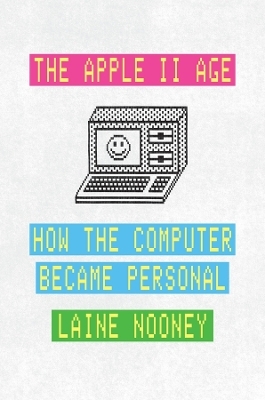
The Apple II Age
How the Computer Became Personal
Seiten
2025
University of Chicago Press (Verlag)
978-0-226-84003-1 (ISBN)
University of Chicago Press (Verlag)
978-0-226-84003-1 (ISBN)
- Noch nicht erschienen (ca. April 2025)
- Portofrei ab CHF 40
- Auch auf Rechnung
- Artikel merken
An engrossing origin story for the personal computer—showing how the Apple II’s software helped a machine transcend from hobbyists’ plaything to essential home appliance.
Skip the iPhone, the iPod, and the Macintosh. If you want to understand how Apple Inc. became an industry behemoth, look no further than the 1977 Apple II. Designed by the brilliant engineer Steve Wozniak and hustled into the marketplace by his Apple cofounder Steve Jobs, the Apple II became one of the most prominent personal computers of this dawning industry.
The Apple II was a versatile piece of hardware, but its most compelling story isn’t found in the feat of its engineering, the personalities of Apple’s founders, or the way it set the stage for the company’s multibillion-dollar future. Instead, historian Laine Nooney shows, what made the Apple II iconic was its software. In software, we discover the material reasons people bought computers. Not to hack, but to play. Not to code, but to calculate. Not to program, but to print. The story of personal computing in the United States is not about the evolution of hackers—it’s about the rise of everyday users.
Recounting a constellation of software creation stories, Nooney offers a new understanding of how the hobbyists’ microcomputers of the 1970s became the personal computer we know today. From iconic software products like VisiCalc and The Print Shop to historic games like Mystery House and Snooper Troops to long-forgotten disk-cracking utilities, The Apple II Age offers an unprecedented look at the people, the industry, and the money that built the microcomputing milieu—and why so much of it converged around the pioneering Apple II.
Skip the iPhone, the iPod, and the Macintosh. If you want to understand how Apple Inc. became an industry behemoth, look no further than the 1977 Apple II. Designed by the brilliant engineer Steve Wozniak and hustled into the marketplace by his Apple cofounder Steve Jobs, the Apple II became one of the most prominent personal computers of this dawning industry.
The Apple II was a versatile piece of hardware, but its most compelling story isn’t found in the feat of its engineering, the personalities of Apple’s founders, or the way it set the stage for the company’s multibillion-dollar future. Instead, historian Laine Nooney shows, what made the Apple II iconic was its software. In software, we discover the material reasons people bought computers. Not to hack, but to play. Not to code, but to calculate. Not to program, but to print. The story of personal computing in the United States is not about the evolution of hackers—it’s about the rise of everyday users.
Recounting a constellation of software creation stories, Nooney offers a new understanding of how the hobbyists’ microcomputers of the 1970s became the personal computer we know today. From iconic software products like VisiCalc and The Print Shop to historic games like Mystery House and Snooper Troops to long-forgotten disk-cracking utilities, The Apple II Age offers an unprecedented look at the people, the industry, and the money that built the microcomputing milieu—and why so much of it converged around the pioneering Apple II.
Laine Nooney is assistant professor of media and information industries at New York University. Their research has been featured by outlets such as the Atlantic, Motherboard, and NPR. They live in New York City, where their hobbies include motorcycles, tugboats, and Texas Hold’em.
Introduction
1 Prehistories of the Personal
2 Cultivating the Apple II
3 Business: VisiCalc
4 Games: Mystery House
5 Utilities: Locksmith
6 Home: The Print Shop
7 Education: Snooper Troops
Inconclusions
Epilogue: On the Consignment Floor
Acknowledgments
A Note on Archives and Sources
Notes
Bibliography
Index
| Erscheint lt. Verlag | 19.4.2025 |
|---|---|
| Zusatzinfo | 19 color plates, 29 halftones |
| Sprache | englisch |
| Maße | 152 x 229 mm |
| Gewicht | 454 g |
| Themenwelt | Geschichte ► Teilgebiete der Geschichte ► Technikgeschichte |
| Informatik ► Betriebssysteme / Server ► Macintosh / Mac OS X | |
| ISBN-10 | 0-226-84003-4 / 0226840034 |
| ISBN-13 | 978-0-226-84003-1 / 9780226840031 |
| Zustand | Neuware |
| Informationen gemäß Produktsicherheitsverordnung (GPSR) | |
| Haben Sie eine Frage zum Produkt? |
Mehr entdecken
aus dem Bereich
aus dem Bereich
Buch | Softcover (2024)
Lehmanns Media (Verlag)
CHF 27,90
Eine superschnelle Menschheitsgeschichte des digitalen Universums
Buch | Hardcover (2024)
Heyne (Verlag)
CHF 33,55


